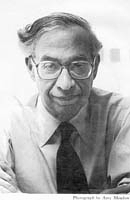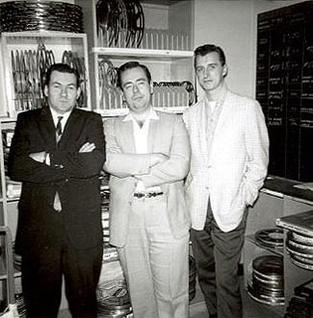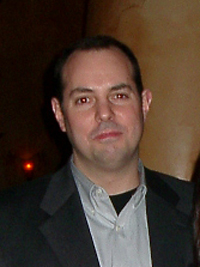
Donald Allen Wollheim was an American science fiction editor, publisher, writer, and fan. As an author, he published under his own name as well as under pseudonyms, including David Grinnell, Martin Pearson, and Darrell G. Raynor. A founding member of the Futurians, he was a leading influence on science fiction development and fandom in the 20th-century United States. Ursula K. Le Guin called Wollheim "the tough, reliable editor of Ace Books, in the Late Pulpalignean Era, 1966 and '67", which is when he published her first two novels in Ace Double editions.

Robert Albert Bloch was an American fiction writer, primarily of crime, psychological horror and fantasy, much of which has been dramatized for radio, cinema and television. He also wrote a relatively small amount of science fiction. His writing career lasted 60 years, including more than 30 years in television and film. He began his professional writing career immediately after graduation from high school, aged 17. Best known as the writer of Psycho (1959), the basis for the film of the same name by Alfred Hitchcock, Bloch wrote hundreds of short stories and over 30 novels. He was a protégé of H. P. Lovecraft, who was the first to seriously encourage his talent. However, while he started emulating Lovecraft and his brand of cosmic horror, he later specialized in crime and horror stories working with a more psychological approach.

Theodore Sturgeon was an American fiction author of primarily fantasy, science fiction, and horror, as well as a critic. He wrote approximately 400 reviews and more than 120 short stories, 11 novels, and several scripts for Star Trek: The Original Series.

A paperback book is one with a thick paper or paperboard cover, and often held together with glue rather than stitches or staples. In contrast, hardback (hardcover) books are bound with cardboard covered with cloth, leather, paper, or plastic.

Ballantine Books is a major American book publisher that is a subsidiary of German media conglomerate Bertelsmann. Ballantine was founded in 1952 by Ian Ballantine with his wife, Betty Ballantine. Ballantine was acquired by Random House in 1973, which in turn was acquired by Bertelsmann in 1998 and remains part of that company.

Men's adventure is a genre of magazine that was published in the United States from the 1940s until the early 1970s. Catering to a male audience, these magazines featured pin-up girls and lurid tales of adventure that typically featured wartime feats of daring, exotic travel or conflict with wild animals. These magazines were also colloquially called "armpit slicks", "men's sweat magazines" or "the sweats", especially by people in the magazine publishing or distribution trades.

Byron Preiss was an American writer, editor, and publisher. He founded and served as president of Byron Preiss Visual Publications, and later of ibooks Inc. Many of his projects were in the forms of graphic novels, comics, illustrated books, and children's books. Beyond traditional printed books, Preiss frequently embraced emerging technologies, and was recognized as a pioneer in digital publishing and as among the first to publish in such formats as CD-ROM books and ebooks.
Mark V. Ziesing is an American small press publisher and bookseller, founded by Mark Ziesing. Active as a bookseller, from 1972 to present; Ziesing was in publishing, from the mid-1980s into 1998. The Ziesing publishing imprint specialized in science fiction, horror, and other forms of speculative fiction. Originally based in Willimantic, Connecticut and in partnership with his brother Michael, he published two books by Gene Wolfe under the name Ziesing Brothers.
Weird Heroes, subtitled "New American Pulp", was an American series of novels and anthologies produced by Byron Preiss in the 1970s that dealt with new heroic characters inspired by pulp magazine characters.
Lancer Books was a publisher of paperback books founded by Irwin Stein and Walter Zacharius that operated from 1961 through 1973. While it published stories of a number of genres, it was noted most for its science fiction and fantasy, particularly its series of Robert E. Howard's Conan the Barbarian tales, the first publication of many in paperback format. It published the controversial novel Candy by Terry Southern and Mason Hoffenberg, and Ted Mark's ribald series The Man from O.R.G.Y. Lancer paperbacks had a distinctive appearance, many bearing mauve or green page edging.

James Judson Harmon, better known as Jim Harmon, was an American short story author and popular culture historian who wrote extensively about the Golden Age of Radio. He sometimes used the pseudonym Judson Grey, and occasionally he was labeled Mr. Nostalgia.

Van Allen Plexico is an American professor of Political Science and History, a Sports and Pop Culture podcast host and producer, and a science fiction and fantasy author. He is generally considered one of the leading figures in the New Pulp movement.

Nebula Winners Thirteen is an anthology of science fiction short works edited by Samuel R. Delany. It was first published in hardcover by Harper & Row in February 1980, with a paperback edition following from Bantam Books in August 1981.

The 1972 Annual World's Best SF is an anthology of science fiction short stories edited by Donald A. Wollheim and Arthur W. Saha, the initial volume in a series of nineteen. It was one of two follow-up volumes to the previous year's World's Best Science Fiction: 1971 edited by Wollheim and Terry Carr for Ace Books, the other being Carr's The Best Science Fiction of the Year. The Wollheim/Saha title was first published in paperback by DAW Books in May 1972, followed by a hardcover edition issued in July of the same year by the same publisher as a selection of the Science Fiction Book Club. For the hardcover edition the original cover art of John Schoenherr was replaced by a new cover painting by Frank Frazetta. The paperback edition was reissued by DAW in December 1977 under the variant title Wollheim's World's Best SF: Series One, this time with cover art by John Berkey.

Satellite Science Fiction was an American science-fiction magazine published from October 1956 to April 1959 by Leo Margulies' Renown Publications. Initially, Satellite was digest-sized and ran a full-length novel in each issue with a handful of short stories accompanying it. The policy was intended to help it compete against paperbacks, which were taking a growing share of the market. Sam Merwin edited the first two issues; Margulies took over when Merwin left, and then hired Frank Belknap Long for the February 1959 issue. That issue saw the format change to letter size, in the hope that the magazine would be more prominent on newsstands. The experiment was a failure and Margulies closed the magazine when the sales figures came in.

The Unknown is an anthology of fantasy fiction short stories edited by D. R. Bensen and illustrated by Edd Cartier, the second of a number of anthologies drawing their contents from the American magazine Unknown of the 1930s-1940s. It was first published in paperback by Pyramid Books in April 1963. It was reprinted by the same publisher in October 1970, and by Jove/HBJ in August 1978 A companion anthology, The Unknown Five, was issued in 1964.

The Unknown Five is an anthology of American fantasy fiction short stories edited by D. R. Bensen and illustrated by Edd Cartier, the fourth of a number of anthologies drawing their contents from the American magazine Unknown of the 1930s-1940s. It was first published in paperback by Pyramid Books in January 1964. The cover title of this first edition was The Unknown 5; the numeral was spelled out on the title page and copyright statement. The book was reprinted by Jove/HBJ in October 1978. It has also been translated into German. It was a follow-up to a companion anthology, The Unknown, issued in 1963.

Captain Future was a science fiction pulp magazine launched in 1940 by Better Publications, and edited initially by Mort Weisinger. It featured the adventures of Captain Future, a super-scientist whose real name was Curt Newton, in every issue. All but two of the novels in the magazine were written by Edmond Hamilton; the other two were by Joseph Samachson. The magazine also published other stories that had nothing to do with the title character, including Fredric Brown's first science fiction sale, "Not Yet the End". Captain Future published unabashed space opera, and was, in the words of science fiction historian Mike Ashley, "perhaps the most juvenile" of the science fiction pulps to appear in the early years of World War II. Wartime paper shortages eventually led to the magazine's cancellation: the last issue was dated Spring 1944.

Unicorns! is a themed anthology of fantasy short works edited by American writers Jack Dann and Gardner Dozois, first published in 1982. Their follow-up anthology, Unicorns II, debuted ten years later in 1992.
This is a list of works by Harlan Ellison (1934–2018). It includes his literary output, screenplays and teleplays, voiceover work, and other fields of endeavor.















